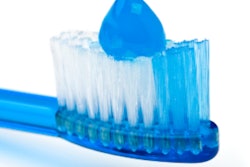
A new qualitative study from the Netherlands reveals what parents think about their children's oral health. The authors found that many parents know about the importance of oral health but want further practical advice from dental professionals.
For the study, they spoke with parents of 7-year-old children about their thoughts on twice-daily toothbrushing and sugary food and drinks. Many parents wanted dentists and hygienists to provide clear advice and practical tips for improving children's oral health habits (BMC Oral Health, December 10, 2015).
"The current study demonstrated that many parents in the focus groups possessed sufficient oral health knowledge and motivation, but they still reported many barriers to adhere to the advice," wrote Denise Duijster, PhD; Maddelon de Jong-Lenters, DDS, PhD; and colleagues from the University of Amsterdam and VU University. "This suggests that where parents accept preventive health messages, many need support in implementing them."
What are the barriers to oral health?
While many studies gather data points on children's oral health habits and parents' dental health knowledge, few investigate what parents think of the messages. The authors desired to do a focus-group-driven, qualitative study to better understand parents' perspectives on oral hygiene habits.
“The current study demonstrated that many parents in the focus groups possessed sufficient oral health knowledge and motivation, but they still reported many barriers to adhere to the advice.”
"Focus groups were chosen as a method, as opposed to individual interviews, because it encourages parents to provide open responses, and it allows parents to build on each other's ideas through facilitated discussion," they wrote.
The authors sought out parents from varying socioeconomic backgrounds, geographical regions, and ethnic backgrounds to get a range of views. The parents' children were all around 7-years-old and had a range of caries prevalence.
A total of 39 parents participated in the study, and the authors broke the participants into six focus groups based on similar socioeconomic and cultural characteristics:
- Two groups of Dutch parents with high socioeconomic status
- Two groups of Dutch parents with low socioeconomic status
- One group of Turkish immigrant parents
- One group of Moroccan immigrant parents
The two immigrant groups were chosen because together they represent about 18% of the population of large Dutch cities and because caries is particularly prevalent among those two ethnic groups.
Although many parents considered dental professionals to be the main providers of oral health support, they felt dental teams spend little time teaching parents about caries prevention, according to the authors. Parents specifically wanted advice that they could apply immediately in their daily lives, such as using stickers as an incentive for children to brush their teeth or examples of healthy, noncariogenic snacks.
"Common requests were to receive clear and tailored advice and practical tips to help the implementation of dentally healthy behaviors for their child," the authors wrote. "They also stressed that they wanted to feel heard and supported by the person providing the health information, rather than feeling blamed."
Other findings from the study included the following:
- Parents perceived twice daily tooth brushing as the social norm, and most parents brushed their children's teeth twice a day.
- Many Turkish and Moroccan parents were not concerned about the child's diet because they did not believe that consuming sugary foods and drinks could damage teeth.
- Parents with a standard daily structure reported little difficulty in controlling their child's sugar consumption at home but felt there were many barriers to ensuring a healthy diet at school. The opposite was true for parents with only a loose daily structure.
What can dental professionals do?
The authors specifically noted that there is a discrepancy between the problems identified by parents and their proposed solutions. They recommended follow-up qualitative research studies to ask what intervention strategies could directly affect perceived barriers.
The study was limited because the researchers could not include parents who did not speak the Dutch language and because only the parents of children who regularly visited a dentist were selected. Perhaps most obviously, the study also only involved 39 parents in the Netherlands. However, even if the results may not be directly applicable to other countries, they can still be interesting food-for-thought for dental professionals elsewhere.
"Their suggestions for professional oral health support can guide the development or improvement of caries preventive interventions," the authors concluded. "Important suggestions included the provision of clear oral health education using a positive approach, early referral to a dental practice, dietary regulations at school, and a multidisciplinary approach in providing parental support, in which dental professionals, child health centers, and other institutions work closely together to promote children's oral health."



















